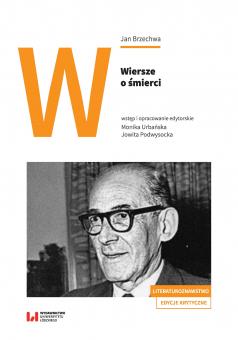-
2364
-
1486
-
1328
-
1191
-
1055
Jan Brzechwa, Wiersze o śmierci
Seria:
Literaturoznawstwo. Sylwetki
ISBN
ISBN-13 (15)
978-83-8331-144-9
Słowa kluczowe:
Jan Brzechwa, poezja XX wieku, oniryzm, élan vital
Opublikowane:
30 marca 2023
Kategorie:
Filologia polska
Pliki do pobrania
Prawa autorskie (c) 2023 © Copyright by Spadkobiercy Jana Brzechwy, © Copyright for this edition by Uniwersytet Łódzki, Łódź 2023
Licencja
LicencjaJak cytować
Brzechwa, Jan. 2023. Jan Brzechwa, Wiersze O śmierci. Zredagowane przez Monika Urbańska i Jowita Podwysocka. Literaturoznawstwo. Sylwetki. Poland: Wydawnictwo Uniwersytetu Łódzkiego. https://www.press.uni.lodz.pl/index.php/wul/catalog/book/62.
Inne teksty tego samego autora
- Monika Urbańska, Magdalena Kuran, Małgorzata Pawlata, Joanna Raźny, Jowita Podwysocka-Modrzejewska, Mateusz Poradecki, Agnieszka Wypiorczyk, Lustro
- Michał Kuran, Aleksandra Goszczyńska, Katarzyna Ossowska-Kulińska, Paulina Poterała, Magdalena Górowska-Mitrus, Marta Kłak-Ambrożkiewicz, Anna Frankowska, Michał Sadowski, Monika Urbańska, Łukasz Wróblewski, „Labor omnia vincit improbus”
- Monika Urbańska, Ilona Koziarska, Daniel Kamocki, Małgorzata Pawlata, Agnieszka Wypiorczyk, Jowita Podwysocka-Modrzejewska, Nadia Krzesłowska, Justyna Groblińska, Katarzyna Kowalik, Inspiracja
- Michał Kuran, Jacek Szlufik, Joanna Jabłońska, Natalia Poleszak, Beata Marcinowska, Hanna Żbikowska, Monika Urbańska, Ewa Kuliś, Ewa Mikuła, Magdalena Godyń, Dorota Rybak, Dawid Kujawa, Daniela Zajączkowska, Paulina Poterała, Magdalena Ciechańska, Katarzyna Przybyła, Paula Sztark, Paulina Urbańska, Sławomir Hornik, Ewelina Drzewiecka, Marta Kalarus, Patrycja Bąkowska, Monika Kusek-Dyja, Piotr Polaszek, Michał Sadowski, Joanna Pomykalska, Martyna Badowicz, Sylwia Kubowicz, Sen, marzenie, zaświaty w literaturze i kulturze
- Michał Kuran, Kamila Kulesza, Dawid Nowakowski, Anna Ż. M. Wiśniewska-Grabarczyk, Katarzyna Stępińska, Michał Sadowski, Bartłomiej Łuczak, Joanna Jabłońska, Sylwia Kępa, Anna Kaźmierska, Katarzyna Bis, Klaudia Adamczewska, Beata Prokopczyk, Ewelina Szymczak, Magdalena Ciechańska, Mateusz Grabowski, Aldona Jankowska, Monika Urbańska, Aleksandra Smusz, Katarzyna Ossowska, Kamil Dźwinel, Paulina Poterała, Marta Tyszko, Monika Bednarczyk, Ewa Joanna Marczak, Joanna Popławska, Stanislava Schupplerová, Małgorzata Herchel, Starość i młodość w literaturze i kulturze











